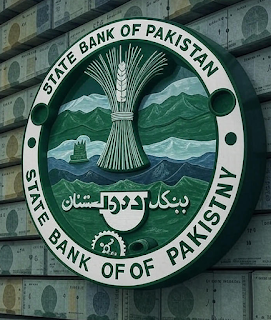STATE BANK :-
It was established on 1st of July1948. The state bank of Pakistan Act 1956, throws light on its functions and importance in the following words,"To regulate the monetary and credit system of Pakistan to faster the growth in the best national interest with a view to securing stability and full utilization of the country's productive resources.
The original share capital of the bank is three crore rupees. Its 51% of the total share capital was contributed by the government and remaining 49% by the private sector. It is not guided by profit motive in its operations. Its major objective is stability of the economy.
One board of directors supervises its affairs Governor is the Chief Executive of the bank, who controls the affairs of the bank on behalf of the central board. It has 14 departments.
FUNCTIONS OF STATE BANK OF PAKISTAN
1. Right Of Note Issue :-
The state bank of Pakistan is the only bank which has the right to issue the note above then one rupee in Pakistan. Proportional reserve system was adopted up to Dec. 1965. Now minimum reserve system of note issue is prevailing. The amount of notes in circulation can be increased according the demand of the public, but it keeps in view the price level in the country.2. Bankers Bank :-
All the commercial banks in Pakistan having paid up capital 5 or more then 5 million rupees maintain their cash reserve with the state bank of Pakistan. They keep at least 3.5% balance of the total demand. The state bank acts as a custodian of these cash reserves. The state bank settles these debts with the daily clearing cheques. The state bank takes various measures to control the commercial banks.3. Banker To The Govt. :-
Federal and Provincial Governments cash balance are deposited with the state ban. It controls foreign exchange reserves on behalf of the government. It also floats new loans to the provincial government on behalf of the government. So the state bank of Pakistan acts as a banker to the government.4. Stable Exchange Rate :-
The state bank of Pakistan is also responsible to maintain the stability in the exchange rate. Our currency value fluctuates in the market because Pakistani rupee is linked with the basket of currencies of trading countries. So the state bank of Pakistan maintains the official exchange rate.5. Financial Adviser :-
The SBP is the financial adviser to the government of Pakistan. The state bank provides advice to the government about the balance of payment condition its impact on the economy. It also provides advice to the commercial banks and financial institutions keeping in view the national interest.6. Acts As Clearing House :-
A clearing house is a place where the representative of all the commercial banks sit together daily to settle their cheques drawn upon each other. The state bank acts as a clearing house for the. SBP helps them in making payments by minimum transactions.7. Credit Controller :-
The state bank has the power to control the credit by using the credit instruments. In case of inflation it contracts the credit while in case of deflation it expands the volume of credit. It uses the policy of open market operation, bank rate policy and cash reserve percentage according the economic condition of the country. In 2001 the SBP reduced the interest rate from 16% to 13.7%. To encourage the investment in the country this policy has been adopted.8. Lender Of Last Resort :-
If any time commercial banks are short of cash reserve the SBP saves them from this problem. The bank is the lender of the last resort. The SBP provides cash to the commercial banks by re-discounting their bills. It saves the commercial banks from solvency.9. Role In The Economic Development :-
The bank is playing very important role in increasing the growth and economic stability in the country. It has promoted various investment activities in the country.10. Role For Capital Market :-
SBP has played very effective role in improving the capital market. Due to his efforts rate of investment has increased. Foreign investments has also shown the positive indication in the capital market.








0 Comments